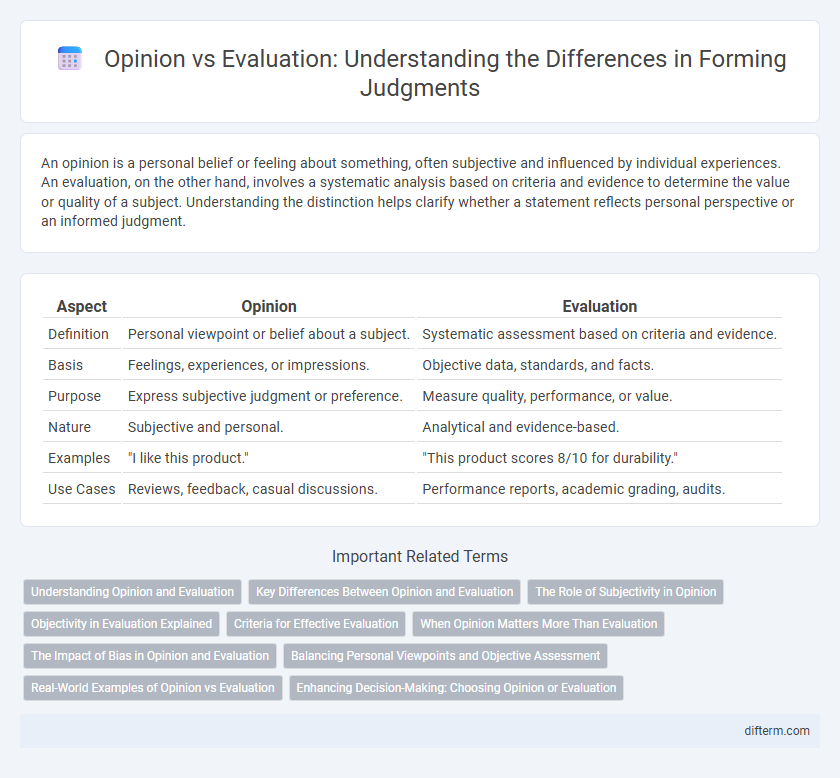An opinion is a personal belief or feeling about something, often subjective and influenced by individual experiences. An evaluation, on the other hand, involves a systematic analysis based on criteria and evidence to determine the value or quality of a subject. Understanding the distinction helps clarify whether a statement reflects personal perspective or an informed judgment.
Table of Comparison
| Aspect | Opinion | Evaluation |
|---|---|---|
| Definition | Personal viewpoint or belief about a subject. | Systematic assessment based on criteria and evidence. |
| Basis | Feelings, experiences, or impressions. | Objective data, standards, and facts. |
| Purpose | Express subjective judgment or preference. | Measure quality, performance, or value. |
| Nature | Subjective and personal. | Analytical and evidence-based. |
| Examples | "I like this product." | "This product scores 8/10 for durability." |
| Use Cases | Reviews, feedback, casual discussions. | Performance reports, academic grading, audits. |
Understanding Opinion and Evaluation
Opinion reflects personal beliefs or feelings shaped by individual experiences and emotions, whereas evaluation involves systematic judgment based on criteria and evidence. Understanding opinion requires recognizing subjectivity and personal bias, while evaluation demands an objective analysis of facts and standards. Differentiating these concepts enhances critical thinking and decision-making processes in various contexts.
Key Differences Between Opinion and Evaluation
Opinion reflects a personal belief or judgment based on individual feelings and perspectives, often subjective and unverified. Evaluation involves a systematic assessment against set criteria, emphasizing objectivity and supported by evidence or standards. The key difference lies in opinion's reliance on personal views, while evaluation prioritizes measurable and criterion-based analysis.
The Role of Subjectivity in Opinion
Opinion inherently involves subjectivity as it reflects personal beliefs, feelings, and perspectives, all influenced by individual experiences and emotions. Unlike evaluations, which attempt to assess or judge based on objective criteria or standards, opinions are shaped by unique cognitive and affective factors that vary from person to person. This subjectivity highlights the importance of recognizing diverse viewpoints without expecting uniform agreement or definitive proof.
Objectivity in Evaluation Explained
Evaluation differs from opinion through its emphasis on objectivity and evidence-based analysis, relying on measurable criteria rather than personal feelings. Evaluations aim to provide systematic assessments using data and standards, ensuring consistency and reproducibility. This objective framework distinguishes evaluations as critical tools in decision-making, unlike subjective opinions that reflect individual preferences and biases.
Criteria for Effective Evaluation
Effective evaluation relies on clear, objective criteria that measure specific attributes related to performance, quality, or outcome, distinguishing it from mere opinion. Evaluations use standardized benchmarks and evidence-based analysis to provide consistent and actionable feedback. Opinions lack these structured frameworks, making evaluations essential for informed decision-making and improvement.
When Opinion Matters More Than Evaluation
Opinion matters more than evaluation when subjective experiences and personal values drive decision-making, as individual perspectives can reveal unique insights that standardized metrics may overlook. In creative fields like art and design, opinions capture emotional and aesthetic reactions that evaluations based on fixed criteria often fail to reflect. Prioritizing opinion over evaluation enables a deeper understanding of diverse human responses beyond quantitative measurements.
The Impact of Bias in Opinion and Evaluation
Bias significantly influences both opinion and evaluation by shaping perceptions and judgments, often leading to subjective conclusions rather than objective assessments. Opinions are inherently personal and prone to cognitive biases like confirmation bias, while evaluations demand a structured approach to minimize bias and ensure fairness. Understanding these distinctions helps in developing more accurate and reliable decision-making processes across various fields.
Balancing Personal Viewpoints and Objective Assessment
Balancing personal viewpoints and objective assessment requires distinguishing between subjective opinions and evidence-based evaluations that rely on measurable criteria. Opinions reflect individual beliefs shaped by experiences and emotions, while evaluations demand critical analysis supported by facts and consistent standards. Achieving this balance enhances credibility by integrating personal insight with impartial judgment.
Real-World Examples of Opinion vs Evaluation
Opinions express personal beliefs or feelings, such as preferring a particular movie genre, while evaluations provide objective assessments based on criteria, like rating a film's cinematography and acting quality. For instance, saying "I find this restaurant's food delicious" reflects an opinion, whereas "The restaurant scored 8 out of 10 for food quality and service" exemplifies an evaluation. Distinguishing between opinion and evaluation is essential in decision-making processes across fields like marketing, education, and product reviews.
Enhancing Decision-Making: Choosing Opinion or Evaluation
Opinions reflect personal beliefs or feelings, providing subjective insights that shape individual perspectives, while evaluations offer structured assessments based on criteria and evidence, promoting objective judgment. Enhancing decision-making requires discerning when to rely on opinion for nuanced understanding or evaluation for measurable outcomes. Selecting between opinion and evaluation ensures balanced decisions by integrating emotional context with analytical rigor.
opinion vs evaluation Infographic

 difterm.com
difterm.com